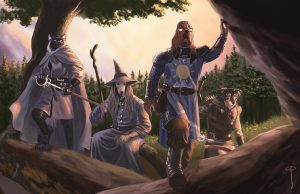When I first started hiring writers to work in the Realms of Pugmire, I knew I had to articulate the tone the game goes for. For years I got by with a sense of “I’ll know it when I see it,” but that wasn’t sustainable. Going forward, I had to spell out exactly how Pugmire uses concepts like grief, loss, and humor. So I wrote a lengthy essay/rant about the topic for my writer’s guide, and now I’m sharing it with all of you for the first time ever. Enjoy!
Let me start by spelling it out: Pugmire is ultimately about the power and danger of nostalgia. Everything (intentionally or unintentionally) points back to this concept, whether it’s the fact that dogs worship an idealized humanity or the intentional use of Dungeons & Dragons as a mechanical base. That’s the secret lurking at the heart of this world — Pugmire is built to evoke fondness for what has come before.
Taken a step further, nostalgia can be funny or it can be sad, and in an ideal world, Pugmire strives to be both. In the very first version of the game (ominously titled “The Fall of Pugmire”), the elegiac qualities were very strong, and melancholy has a strong connection with nostalgia. And the funny thing about nostalgia is that it works primarily because we don’t clearly remember all the details. Thus, a story evocative of nostalgia is not one that’s a slavish reproduction of what came before, but evocative of the high points, the parts that really resonated, the parts that mattered. That’s why the world of Pugmire isn’t exactly recognizable as our own, why the dogs aren’t exactly right about what humanity was, and why the game system isn’t exactly like old-school gaming. It’s the best bits of all of those things, blended together into one seamless whole.
But Pugmire is being experienced by people, and in particular people with at least a moderate knowledge or affinity for fantasy fiction and gaming tropes. As such, it takes on an additional meta-textual context. These people want to enjoy that nostalgic and elegiac feel because of a love of animals (including those pets that have passed on), a desire for a simple game experience (including mourning the days when they had the time to play more complex games), or an increasingly nebulous definition of “light-hearted fun.” It’s probably a combination of all of these. In my experience, “simple” is usually code for “I recognize these tropes” along with “I have very few barriers to understanding this.” Trying to understand “fun” would require a whole book (and, indeed, such books have been written), but for our purposes it generally tends to mean “I want to laugh a bit, ideally with friends and family.”
But I reject the notion that “simple” and “fun” are at odds with challenging narratives. In fact, because of the meta-textual context — these are people who know how fantasy tropes work, after all — we’re in a place where we can twist and subvert those tropes to make for engaging stories. We laugh at the cat that tries to act like a dog, or nobles that enforce a strong lineage to pass on humorous familial traits, or characters that are aggressively supportive of concepts like “be a good dog.” And yet, we’re left with the vague sense that maybe these things aren’t okay when applied to people. But if these dogs and cats and other uplifted animals are presented as authentic characters, as authentic people, then maybe it’s not okay when applied to them, either. This gives us leave to take problematic tropes like “evil races” “rescuing the princess” and change them in ways that still make sense in the world, and thus still feel authentic. This is why cats aren’t evil, and why Princess Yosha Pug goes out to adventure and can rescue herself, thank you very much. And yet, in them we still recognize different (and, frankly, more inclusive) concepts like “the people we don’t trust” and “nobility as morally superior leaders.”
This also applies to the humor. If the meta-narrative humor drowns out the story context, then the humor has failed. “Be a good dog” works because the humor supports and reinforces the concept — there are plenty of comic strips that play off the religious overtones of the phrase, and that’s exactly where we go as well. Having a Shiba Inu head of the Church of Man with the title of “Doge” drowns out anything that character might do that’s narratively interesting. A few characters are intentionally humorous and can get away with more (look to Alastair Afghan as an example), but all in all the humor should work with the world concept, not against it.
None of this needs to be done intentionally as you work on Pugmire. In fact, in my experience, it’s better if it’s not foremost in my mind when I write. But it does help when going back and deciding what makes for “authentic Pugmire” or not. Since this is an evolving property, my response to a lot of things will be some form of “I’ll know it when I see it,” but the above rant may help you to see it too, before it even gets to me.


Comments
3 responses to “Why Pugmire Is Not A Funny Dog Game [Realms of Pugmire]”
Well Said Absolutely!
If Pugmire is ‘Nostalgia + Humor’ then what is Monarchies of Mau?
I have thoughts, but mostly I think: YES! YES! And of course, YES! Thank you.